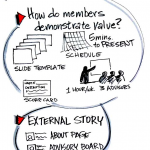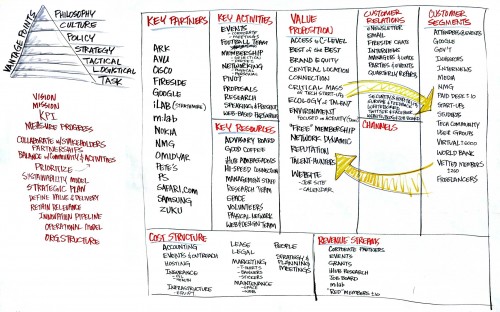This weekend the iHub Advisory Board met with the managers (Tosh and Jessica) to discuss the future direction of the space and what our focus should be for the coming year. The meeting was facilitated by my friend Peter Durand of Alphachimp Studios, who is in town as a part of the PopTech Lab.
The iHub Advisory Boards is made up of 5 people who come from the Nairobi tech community, and represent the community when important, or difficult, decisions have to be made. They are:
- Riyaz Bachani, Wananchi executive, now in charge of Wazi WiFi
- Josiah Mugambi, Co-Founder of Skunkworks, works at Nokia Siemens
- Rebeccah Wanjiku, Tech reporter and founder of Fireside Communications
- Conrad Akunga, Blogger, co-founder of Mzalendo and highly respected software architect
- Erik Hersman, Tech blogger and co-Founder of Ushahidi
Looking at 2012
Our overall focus has always been that we should look to serve the tech community first, and that everything else would come from that foundation. As we stepped back to look at what’s happened in the last (almost) 2 years, we tried to identify what worked and where there gaps were.
We first worked through the a “business model canvas”, putting our minds together to find out if we all saw the iHub in the same way, and if what we were doing was what we should be doing. As you can see in the diagram above, we tried to list out all of our partners and community members, then map how we add and receive value from each of them.
A key point of discussion was how do we add value to not just the 250 green members who can come in and use the space, but also the serve the needs of the other 6,000 white members in the “virtual” community. We’ll have more thoughts and announcements on this over weeks and months ahead.
Going Deeper by Improving Freelancer Skills
We delved deeper into this, separating the types of individuals between the startup types vs the freelance types. One of the biggest gaps we’ve found is that there are many freelancers, some of whom are working on a startup on the side, but need the funds from their freelance activities to pay the rent.
Our questions became:
- How does the makeup of the iHub green membership reflect different levels of what’s needed for projects to be done? In other words, are we diverse enough?
- How can we help get freelancers more projects?
- How can we help them become better at delivering on their projects?
In order to do freelance work, you often times have to team up with others who offer the skills that you lack. We’ve noticed that we’re primarily developers at the iHub, with some designers sprinkled in, but don’t have enough project managers or quality assurance types. So, our first order of business is to make sure we’re letting the people with these other skill sets know that they’re welcome to be a part of the iHub community too.
A gap that our sector has in Kenya is that companies who want to get a software project done don’t necessarily want to go with just any freelancer. We’ve discussed for some time the way the iHub brand can be used as a vector to find freelancers, but we’ve shied away from doing anything more than connecting people through the job board or through referrals.
The iHub is now looking into doing the following (and for this, we need some community feedback and help).
- Standardize a process for clients to interact with iHub freelancers, using the iHub brand as a vector for business needs to be solved by the technology community.
- Creating a way for developers, designers, project managers and QA people to collaborate and form teams to work on client projects. To be on the “shortlist” of freelancers, each would have to pass a test to make sure they are at the appropriate level.
- Bring in a very specific and targeted type of mentoring and business skill training to focus on the individuals in this program, so that we can get a better culture of on-time delivery, communications and quality of work.
- Put in place a system, upon project completion, for clients to rate the team, or individuals, who do the work. This would be tied to iHub member’s profiles, and anyone who under-delivers would be dropped from the pool of freelancers.
If you think you have the skills necessary to be on the initial shortlist for paid project work, and are a member of the iHub, let me or Tosh know as we think through this process. We’re looking for 5-10 people to explore this new area with us. Specifically, we’re also looking for a leader with great project management experience.
What YOU Do
As we stated at the beginning, the iHub is about doers not talkers.
 Our final takeaway was on communication by the green members on what they’re doing. To this end, we’ll be putting together a schedule for each of the 250 green members to do a 5-minute presentation, followed by a 5-min Q&A. There will always be a quorum of the iHub Advisory Board present, as they’re the ones who make the final decision on who gets and retains membership. It will also be in front of the other community members who would like to attend so that there is a better understanding in the community of what each of us do.
Our final takeaway was on communication by the green members on what they’re doing. To this end, we’ll be putting together a schedule for each of the 250 green members to do a 5-minute presentation, followed by a 5-min Q&A. There will always be a quorum of the iHub Advisory Board present, as they’re the ones who make the final decision on who gets and retains membership. It will also be in front of the other community members who would like to attend so that there is a better understanding in the community of what each of us do.
We’ll subscribe a very tight template, likely 15 slides that automatically progress, much like Pecha Kucha (or Ignite talks). You won’t be required to give up competitive details, this is more for you to give us an overview of what you’re working on, how the iHub is helping with that, and where the gaps are that you need assistance.
Look for more details on this in the near future, and be ready to sign-up for one of the slots. If you don’t do a presentation, you will lose your green membership.
Final Thoughts
The iHub has been operational for 1.5 years and we’re about to celebrate our 2 year anniversary in March. This cushion of almost 2 years has allowed us to do a lot of experimentation, and we’re still in the process of gathering feedback from the community to get a better understanding of how the iHub is doing and what we can do better.
As that information comes in, we’ll do what we always do, and that is double down on what works and throw out what doesn’t. It would help us greatly if you take part in this feedback process, run by Hilda Moraa out of the iHub Research arm.
Finally, a HUGE thank you to everyone who makes the iHub possible!

